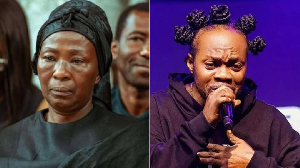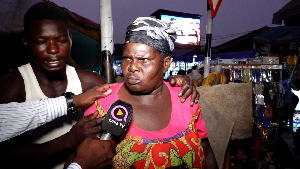Member of Parliament for Manhyia in the Ashanti Region, Mathew Opoku Prempeh, has said that the Electoral Commission would be engaging in an act of illegality and deliberate defiance of the law, should it go ahead and register selected Ghanaians abroad.
He told The New Crusading Guide, “Dr. Afari-Gyan, chairman of the Electoral Commission, was on an IDEG forum on television just last week telling Ghanaians that he works with the law and now he turns around to work with a law that does not exist?”
Napo, as he is popularly known, noted that the PNDC Law 284 on which grounds the EC wants to carry out its latest registration exercise, had been long repealed and amended. “This Law that the EC is sourcing its backing from, does not even exist”, he pointed out.
Napo, who is the head of electoral affairs of the New Patriotic Party, submitted that it was “very unacceptable for the EC to tell politics parties that it was sourcing funding from foreign affairs to go to selected countries to register Ghanaians working with the diplomatic missions and those on government scholarships”.
This act, according to Napo, was not only illegal but “highly discriminatory”.
He told this paper that Act 699 of the Representation of the People's Amendment Law (ROPAL), which replaced the PNDC Law 284, directed the EC to register all Ghanaians who are qualified to vote.
He also went on to say that that amendment directed the EC again, to publish a Constitutional Instrument on how it would do that “EC could have told Ghanaians that due to the cost involved, it would be impossible to register all Ghanaians, but it is untenable for it to carry machines to, let's say London, and register only people working at the diplomatic missions or on government scholarship,” the firebrand NPP guru stressed.
He explained that the law itself did not compulsorily prescribe that only Ghanaians living in Ghana, and of 18 years or above; have an old voter ID card, an NHIS card, passport or any document which is recognized, could register to vote.
Dr. Prempeh intimated that the interpretation the Supreme Court gave to this law had made it obligatory for the EC to register all Ghanaians who meet the criteria to be registered to vote.
“Act 42 of the Constitution did not discriminate. It does not say only Ghanaians living in Ghana could register; it just said all Ghanaian,” he educated.
Dr. Prempeh continued that an obstinate action by the EC to register only selected Ghanaians or those whose names appear on the government's list would be an affront to the laws of the country. Said he, “If there are three Ghanaians in the same school in London-one on a scholarship from the government of Ghana; another on a scholarship from the British Council and the other taken care of by his parents-it will be discriminatory not to register the other two who are not on government scholarship”.
Napo has advised the EC to “come to parliament and lay a Constitutional Instrument to tell us that due to the cost involved, they have to do selective registration because if they don't, then they flout Article 296 which states that 'where in this Constitution or any other law discretionary power is vested in any power or authority, that discretionary power is deemed to imply a duty to be fair and candid”.
Politics of Thursday, 20 September 2012
Source: The New Crusading Guide













